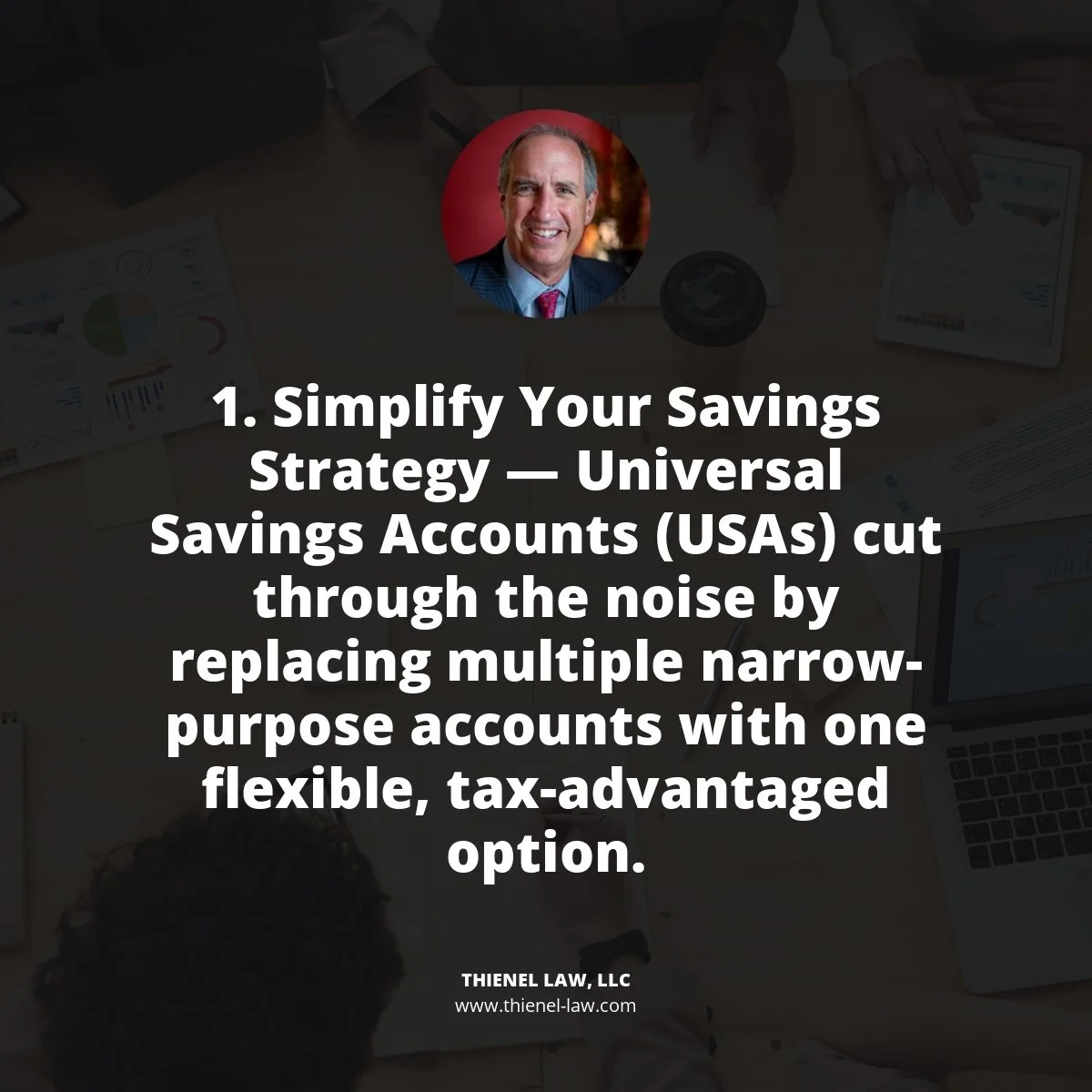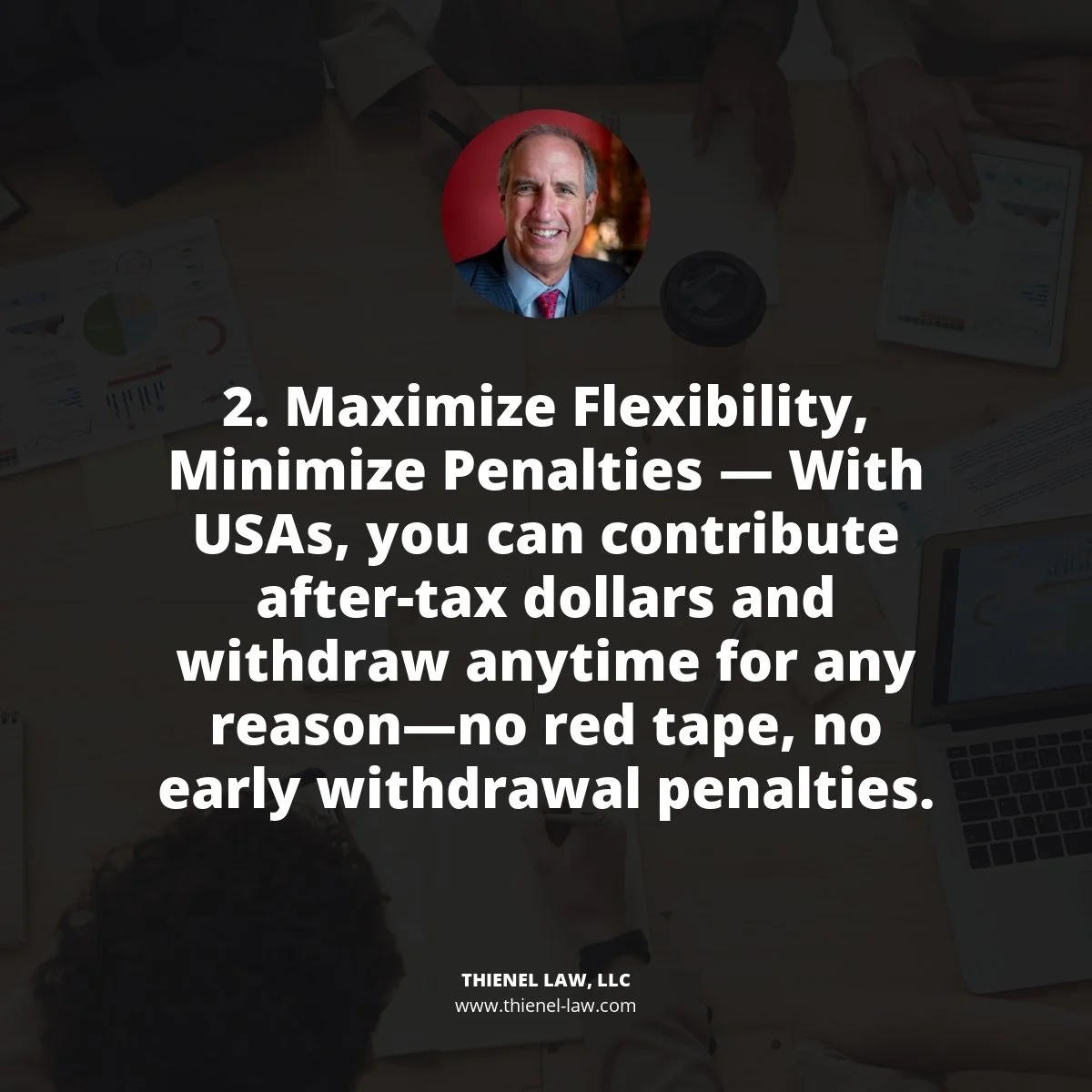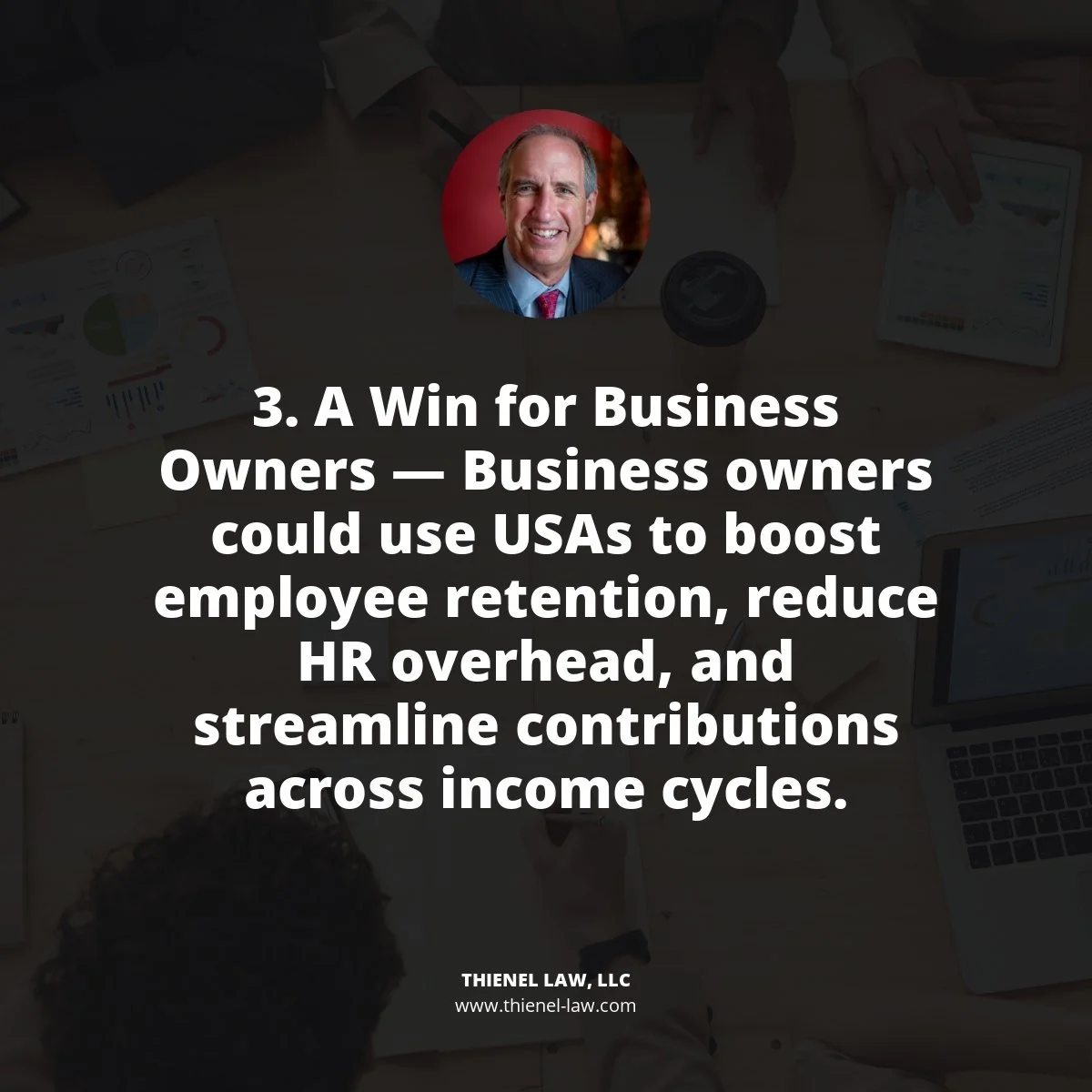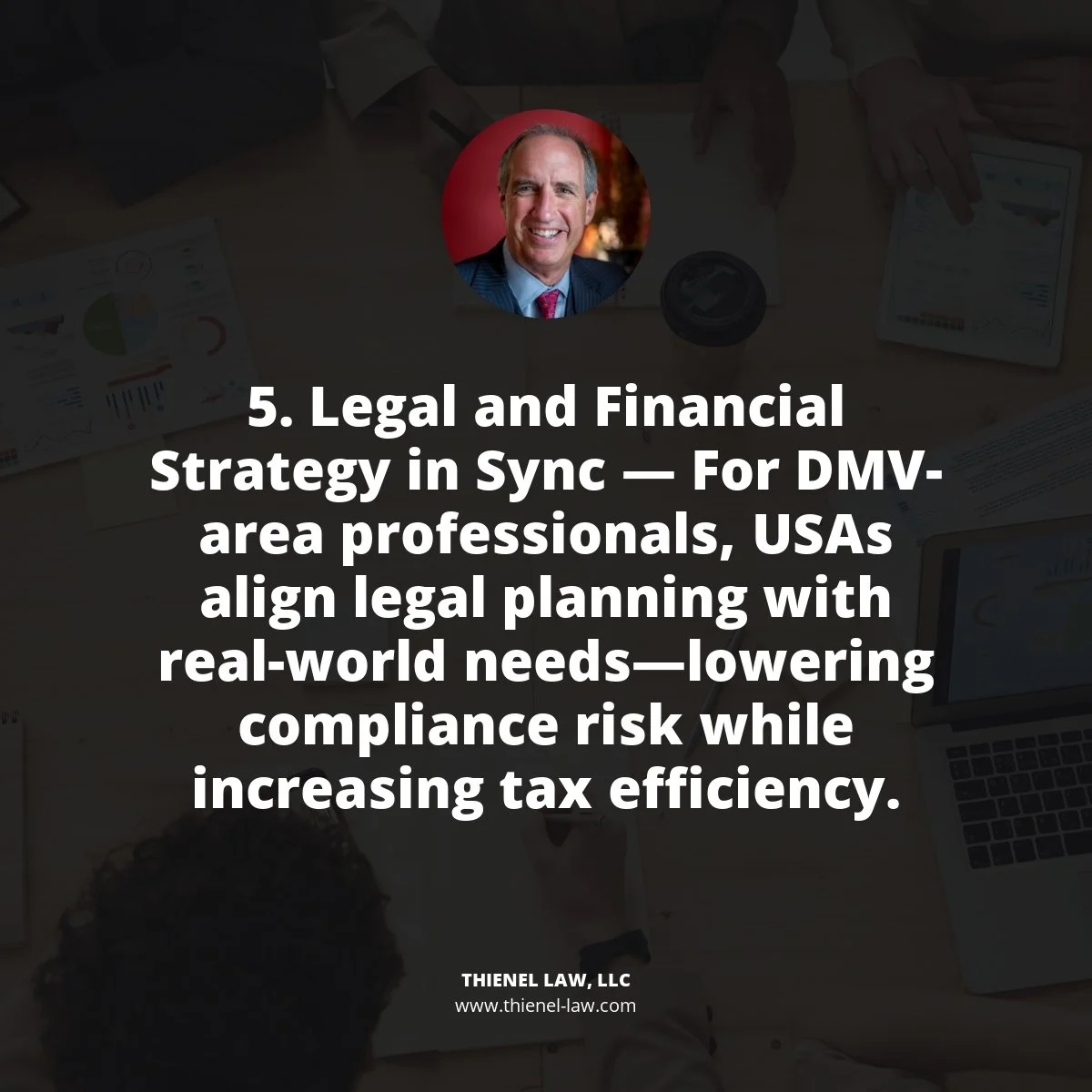Why Universal Savings Accounts Are a Smarter Solution Than Trump Accounts
Key Takeaways
The current landscape of savings accounts is unnecessarily complicated, with overlapping rules and limited flexibility.
Universal Savings Accounts (USAs) offer a streamlined way for taxpayers to save without the confusing distinctions of existing vehicles like IRAs, 529 plans, and HSAs.
Trump's proposed "Trump Accounts" attempt to simplify saving but fall short of the clarity and utility USAs could provide.
For individuals and business owners in Maryland, Virginia, and D.C., a move toward USAs could mean improved financial planning, less red tape, and greater tax efficiency.
Thoughtful reform could transform how high-income earners, small business owners, and estates manage and grow their savings.
Why Savings Reform Matters in the DMV
Whether you're a professional planning for retirement, a growing business optimizing financial strategy, or a high-net-worth individual focused on tax efficiency, understanding how government policy shapes savings options is critical. In the ever-evolving landscape of federal tax law, small changes can have significant ripple effects.
This is especially true for those in the DMV region—Maryland, Virginia, and Washington, D.C.—which is home to a high concentration of government employees, professionals, and entrepreneurial businesses. Unfortunately, existing savings tools are often confusing, riddled with restrictions, and far from intuitive. If the federal government is serious about making saving easier for everyday Americans, there's a compelling case to be made for abandoning the idea of "Trump Accounts" and adopting something more functional: Universal Savings Accounts.
Let's take a closer look.
What's Wrong with the Current System?
At present, U.S. taxpayers have access to a variety of tax-advantaged savings accounts—but each comes with narrow use cases and complicated rules.
Traditional and Roth IRAs are primarily for retirement, with strict income and contribution limits.
529 plans are for education purposes only and have penalties for off-label use.
Health Savings Accounts (HSAs) offer tax advantages for specific medical expenses but require a high-deductible insurance plan.
Flexible Spending Accounts (FSAs) must be spent in a calendar year and typically can't be carried over.
What does this mean in practice? People are forced to segment their savings into small, rule-defined buckets, making it easy to lose track, miss deadlines, or incur penalties. For many small business owners and professionals, it's not just inefficient—it's deeply frustrating.
Instead of being encouraged to save for future needs, taxpayers are burdened with compliance tasks and complex tax treatment. This system discourages proactive planning and penalizes flexibility.
A Look at Trump Accounts
In response to concerns about the complexity of savings, discussions have emerged about introducing Trump Accounts—a political branding of a tax-deferred savings proposal that would, in theory, allow easier saving for retirement or other needs.
While the idea acknowledges the problem—that savings vehicles are too fragmented—Trump Accounts only provide a partial fix. Their design hasn't resolved the central issues: too many rules, overlapping limitations, and purpose-specific restrictions.
From a legal and strategic standpoint, what taxpayers and their advisors need is not another variant of a narrowly-defined account. What they need is something truly universal.
The Case for Universal Savings Accounts
Universal Savings Accounts (USAs) offer a simple concept: A single, tax-advantaged vehicle where individuals can save, invest, and withdraw money for any purpose—without IRS micromanagement.
Here's how they would work:
Contributions made post-tax, similar to a Roth IRA.
No income phase-outs or high-deductible health plan requirements.
Withdrawals could be made at any time, for any reason, without penalty.
Modest contribution limits would cap the government's fiscal exposure.
Several countries, including Canada and the United Kingdom, have adopted similar systems with considerable success. Canada's Tax-Free Savings Account (TFSA) has become one of the most popular investment tools for average citizens because of its ease of use and withdrawal flexibility.
USAs could be especially useful for high-earning professionals and business owners who want to save for a mix of future needs—retirement, family, healthcare, legal contingencies—without being locked into purpose-specific accounts.
Application for Businesses and Business Owners
Universal Savings Accounts would not just benefit individuals; they would have broader implications for private businesses and professional firms alike.
Let's break it down:
1. Business owners could use USAs as an employee retention strategy.
Providing staff with financial education and access to universal savings could serve as a meaningful benefit in lieu of managing multiple narrow-purpose accounts. It could even reduce administrative burdens for HR and reduce liability related to mismanaged retirement plans.
2. LLCs and S-Corps could simplify tax planning for owners and partners.
Currently, many pass-through entities must juggle contributions to SEP IRAs, Solo 401(k)s, and defined benefit pension plans—each with its own filing obligations. With USAs, business owners would have a low-maintenance savings option useful in both high-income and lean years.
3. Estate planning could become more flexible.
Much of estate planning revolves around the transfer of tax-advantaged accounts, each with distinct beneficiary rules. USAs would standardize processes and reduce risk of confusion, especially in blended families or generational wealth strategies.
Example: A DMV-Based Business Owner
Consider a professional based in Bethesda, Maryland—an owner of a small but successful consulting firm structured as an S-Corp. She currently contributes to a Solo 401(k), a 529 plan for her child's education, and funds an HSA through a high-deductible health plan.
While she's financially savvy, she's juggling three accounts with different rules, deadlines, and contribution caps. If she wants to access some of her savings mid-year to fund a new growth opportunity or manage a personal emergency, she's restricted.
With a Universal Savings Account, she could contribute after-tax dollars, let them grow tax-free, and access funds when she needs them—without triggering penalties or tax complications. As the business grows, she could scale contributions, providing flexibility that responds to fluctuating income year-to-year.
Compliance and Planning Opportunities
From a legal advisory perspective, USAs would simplify planning across multiple areas:
Fewer document amendments and plan disclosures for small businesses.
Reduced compliance costs for accountants and tax preparers.
Streamlined succession and exit strategy planning due to more predictable savings structures.
For law firms and fiduciaries managing estates or trusts, USAs could eliminate the patchwork of asset-specific planning that currently involves scrutinizing which funds go where and how they're taxed at death. A Universal Savings Account inheritor could make decisions in real time, based on needs, rather than preset tax categories.
Potential Legislative Challenges
Of course, policy proposals like this face headwinds.
Opponents often argue that USAs favor higher earners because they already have disposable income to save. Others fear tax revenue loss. But these opinions underestimate the broader behavioral benefits of simplified savings. When people are offered simple, understandable tools, they use them—increasing private savings rates and decreasing reliance on public safety nets.
Within a legal context, this is about reducing friction. Complexity is a form of legal risk, and that affects everyone.
What Happens Next?
The current Trump Accounts were created under the One Big Beautiful Bill Act (OBBBA) signed by President Trump on July 4, 2025. However, these accounts are not for adults. The accounts are specifically designed for children under 18 years old.
The Universal Savings Account Act of 2025 (S.1581) was introduced by Senator Cruz, but remains in committee.
There's no clear timeline for implementing Trump Accounts for adults, let alone a shift toward full USAs. But if momentum builds—or if the political climate changes—tax professionals, estate planners, and private clients in the DMV region should be ready to adapt.
The key is to build strategies that can pivot with minimal disruption. This might include:
Using existing Roth accounts in more flexible ways.
Consolidating savings where feasible to reduce administrative overhead.
Structuring business contributions in a way that preserves optionality for the future.
Why It Matters for DMV Professionals
Maryland, Virginia, and D.C. residents are among the most highly educated and financially engaged in the U.S. Many are federal employees, medical professionals, lawyers, or entrepreneurs with varied income streams and long-term planning goals.
For these individuals, the rigidity of niche savings vehicles is particularly unhelpful. A universal solution would represent a major win for simplified finance and scalable planning.
Even modest tax-deferred savings carried out efficiently, with fewer penalties and limitations, can help build more resilient businesses and households.
Final Thoughts
Putting the Trump Account proposal aside, the real goal should be to think bigger—about tools that prioritize flexibility, transparency, and simplicity. Replacing a tangle of rules with one versatile savings account could remove confusion for individuals, cut costs for businesses, and create new opportunities for advisors to deliver value.
As business and tax attorneys, we believe in proactive planning—not reactive problem-solving. That's why we advocate for solutions that reduce legal complexity and align with your real-world financial goals.
If you're unsure how this applies to your business or personal situation, we're here to help. Schedule a consultation with Steve Thienel to get advice tailored to your goals. Whether you're an entrepreneur in Northern Virginia or a high-net-worth family navigating estate planning in D.C., smart financial strategies start with understanding what's at stake.
Let's simplify your savings—and your future.






